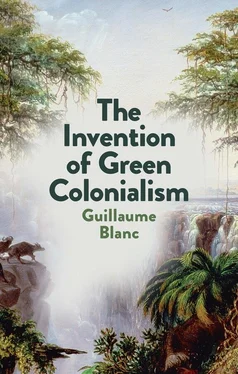Haile Selassie succeeded Menelik II as the leader of this Greater Ethiopia. With the exception of the period of Italian occupation (1936–41), he led the country from 1930 to 1974. As emperor, he imposed a Christian Orthodox culture and a single language, Amharic. Haile Selassie also deployed the classic tools of the nation-state. He established a central administration, a flag and a national anthem and then organized the construction of national museums and the classification of historical monuments. His goal was to unite all the peoples conquered by Menelik under a national identity, and a single Ethiopian state.
As a consequence of his overly zealous drive to Ethiopianize his subjects, in 1974, Haile Selassie was overthrown by the soldiers of the Derg (committee). His remains would be discovered some years later under the office of Mengistu Haile Mariam, the strongman behind the Derg. Thanks to the support of the USSR, Mengistu succeeded in imposing a Marxist-Leninist regime. He nationalized land, collectivized agriculture and successfully suppressed any opposition. Then, as in the days of the empire, the Derg also initiated a programme of Ethiopianization. By introducing free education, protecting a shared historical heritage and increasingly resorting to force, it set about nationalizing those populations which had been part of Greater Ethiopia at the beginning of the twentieth century.
It was the same policy as that pursued under the empire and, inevitably, it met with the same failure. In 1991, the Ethiopian People’s Revolutionary Democratic Front overthrew the Derg. Under Meles Zenawi, prime minister until 2012, the new Federal Democratic Republic of Ethiopia introduced a market economy. This proved so successful that the country became one of the major powers of the continent. Yet national cohesion remained out of reach. The people of the Oromo, Afar or Somalia had been conquered by Menelik a century earlier and, very often, they still refused to accept the Ethiopian identity which the country’s leaders sought to impose on them.
A similar phenomenon can be observed in many African countries. The western press and observers attribute this lack of unity to ethnic divisions. But ‘ethnicity’ is a category invented by Europeans during colonization to impose submission on the kingdoms they were invading. And since then, ethnicism has continued to cast an air of otherness over the whole of Africa: where France had its peoples (3 million Bretons), Ethiopia had its ethnic groups (40 million Oromo). In reality, the word conceals a far simpler story. The colonial frontiers ended up bringing about a superficial regrouping of peoples who are very different from each other – it is as straightforward as that.
From the start of independence to the beginning of the 1960s, African states therefore found themselves doing what western governments had done at the end of the nineteenth century. In order to give substance to the idea of the nation, they created a national story, identified national heroes, built national monuments or rallied around national football teams. And they created national parks. As in the United States, Germany or Switzerland, each African state elevated its parks to the status of national shrines. These natural spaces were intended to allow people to fully experience their country, to admire it and to love it.
Nevertheless, two radically different approaches separate Africa from Europe and North America. Today, in almost every African national park, people are still being evicted and criminalized. And in all these places, this oppression of local people is led by those employed by the international conservation institutions with, at the top of the list, UNESCO, the IUCN and the WWF. It is these two faces of African nature – the international experts, on the one hand, and, on the other, the local inhabitants who are the target of their prejudices – that lie at the heart of this book
Our story therefore draws on history more by necessity than by choice. From the colonial invention of the African Eden to the postcolonial construct imposed by the experts, from the African use of international norms to the myth of sustainable development, only the past can enable us to understand why, even today, western conservationists are intent on making Africa wild, no matter what the cost.
1 1. Author interview with Samson, Debark, 4 January 2019.
2 2. UNESCO, ‘Decisions Adopted during the 41st Session of the World Heritage Committee’, Kraków (Poland), 2017’, p. 27 (whc. unesco.org/archive/2017/whc17-41com-18-en.pdf)
3 3. Ibid.
4 4. D. Brockington and J. Igoe, ‘Eviction for Conservation: A Global Overview’, Conservation and Society, 4-3, 2006, pp. 424–70.
5 5. C. Geisler, ‘A New Kind of Trouble: Evictions in Eden’, International Social Science Journal, 55, 2003, pp. 69–78.
6 6. L. Semal, Bestiaire disparu. Histoire de la dernière grande extinction. Toulouse: Éditions Plume de carotte, 2013.
7 7. L. Semal, Face à l’effondrement. Militer à l’ombre des catastrophes, Paris: PUF, 2019, p. 11.
8 8. Huffpost/AFP, ‘Bolsonaro accuse à nouveau Macron de “colonialisme”’, Huffingtonpost, 26 August 2019, https://www.huffingtonpost.fr/entry/bolsonaro-accuse-a-nouveau-macron-de-colonialism_fr_5d63e6b4e4b02cc97c910dc2.
9 9. B. Akinro and J. Segun-Lean, ‘Beyoncé and the Heart of Darkness’, Africa Is a Country, https://africasacountry.com/2019/09/beyonces-heart-of-darkness.
10 10. D. Leloup, ‘Écofascisme: comment l’extrême droite en ligne s’est réappropriée les questions climatiques’, Le Monde, 4 October 2019, https://www.lemonde.fr/pixels/article/2019/10/04/ecofascisme-comment-l-extreme-droite-en-ligne-s-est-reappropriee-les-questions-climatiques_6014255_4408996.html.
11 11. W. Huismann, Pandaleaks: The Dark Side of the WWF, trans. Ellen Wagner, Bremen: Nordbook UG, 2014.
12 12. ‘Exclusive: OECD Opens Investigations into WWF in World First’, 5 January 2017, https://www.survivalinternational.org/news/11538.
13 13. F. Pigeaud, ‘Le WWF accusé de “colonialisme vert” au Congo’, Mediapart, 20 March 2019, https://mediapart.fr/journal/international/200319/le-wwf-accuse-de-colonialisme-vert-au-congo; T. Warren and K.J.M. Baker, ‘WWF Funds Guards Who Have Tortured and Killed People’, BuzzFeed News, 4 March 2019, https://www.buzzfeednews.com/article/tomwarren/wwf-world-wide-fund-nature-parks-torture-death.
14 14. F. Walter, Les Figures paysagères de la nation. Territoire et paysage en Europe (16e–20e siècle), Paris: Éditions EHESS, 2004, p. 178.
15 15. H. Mendras, The Vanishing Peasant: Innovation and Change in French Agriculture, Cambridge, MA: MIT Press, 1970.
16 16. Parc national des Cévennes, ‘Rapport d’activité de l’établissement public chargé de la gestion du parc national et de la réserve de biosphère des Cévennes. 2001’, Florac, 2002, p. 7.
17 17. E. O’Rourke, ‘The Reintroduction and Reinterpretation of the Wild’, Journal of Agricultural and Environmental Ethics, 13-1, 2000, pp. 145–65.
18 18. UNESCO, ‘The Causses and the Cévennes, Mediterranean Agro-pastoral Cultural Landscape’, https://whc.unesco.org/en/list/1153.
19 19. UNESCO, ‘Simien National Park’, https://whc.unesco.org/en/list/9/.
20 20. I. Grimwood, ‘Ethiopia: Conservation of Nature and Natural Resources (November 1964–February 1965)’, Paris, 1965, p. 4 (UNESCO, WS/0865.66).
Конец ознакомительного фрагмента.
Текст предоставлен ООО «ЛитРес».
Прочитайте эту книгу целиком, купив полную легальную версию на ЛитРес.
Читать дальше












